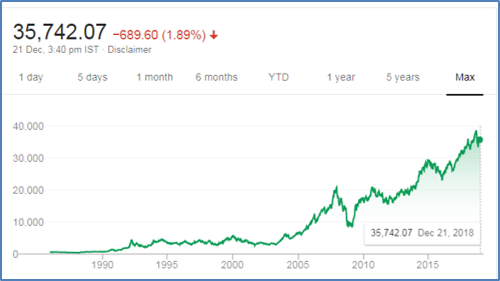Aditi is one of my earliest female clients. And the reason I chose to write about her money story today, is because she inspires me.
A couple of months back, a common friend gave me her contact and we decided to meet at her place. She was newly married and I had almost barged into one of her lazy, cozy weekend. She greeted me well and waited till Karan, her husband, joined us. The agenda was to discuss their finances.
After having a brief discussion about their respective backgrounds, she quickly told me how she had been investing in equity mutual funds since she first started working. And how Karan had been risk averse, so to say. Now that they were married, she wanted to make sure that they have the right asset allocation and hence adequate equity exposure. She wanted an early financial independence for the couple. Meanwhile, I could sense Karan’s limited participation – may be because he was uneasy about equity, I thought.
A couple of weeks back, when I decided to venture into the domain of helping women understand and manage their own finances better, I reached out to Aditi to get her views on the subject. Remembering her as someone who took the lead in discussing family finances, she was one of the very few names that came to my mind.
A transcript of our recent conversation is given below:
Me: How do you feel about the fact that you take decisions around your finances / family finances?
Aditi: Ever since I was a child, my father used to encourage me and my sister to save whatever little earning we used to have. So we have always been conditioned to think of savings as an important aspect. The fact that I started investing since my first job has really helped me continue the practice. And today when I think about it, I realize it is a great feeling to be self – dependent. The ability to take care of my own needs gives me a lot of confidence.
Me: What made you go against the conventional practice of letting the man of the family decide?
Aditi: When we were young, a mass prevailing notion was that women are first the father’s responsibility and then the husband’s. I often questioned myself, why is that? In fact, when I was a kid, I heard someone asking my mom to have a third child, otherwise who would take care of them when they grow older (we are two sisters). It kind of impacted me deeply. I have always wanted my parents to think of me as an asset and not as a liability. I knew for sure that I wanted to change the norm that daughters cannot take care of them when they grow older.
Also, Karan and I both have our respective strengths. Knowing that managing finances is my strength, Karan has proactively taken a step back and is happy to let me handle the key financial decisions. So, for me it was not about going against the conventional practice.
Me: That is a very interesting thing to note Aditi. Because in a lot of families (including the ones where the wife is a home-maker), I notice that the men consider it to be their fundamental duty to take all financial decisions. If only, every couple could mutually agree on the mechanics that works best for them, the family finances could be managed jointly and more amicably.
Aditi: Absolutely. I think I have been lucky in this respect. But a lot of women are not.
Me: And now I understand why Karan wasn’t an active participant when we first met. So tell me, what comes to your mind when you think about “Financial Independence”?
Aditi: Financial Independence is extremely important to me. It is my confidence to live my life my way. I want to go to work because I love my job and not because I have to pay the bills. I want to stay married because I am in love and want to grow old with him and not because I have to as I cannot support myself financially. I want to achieve financial independence to have the freedom to do things I love to do, to live life the way I want to. And when I say “I”, I mean “us”.
Me: What has been your experience with me and CAGRfunds on a whole?
Aditi: I got to know about you and CAGRfunds through a common friend and I am always inspired by people who choose passion over 9-5 jobs. So when my friend told me that some of his friends had started this financial planning company, I was quite kicked about meeting you. Despite the fact that I had already met a few other investment firms before I met you.
The first meeting that we had at my place was something that made me very comfortable with you. It was casual yet relevant. There was a certain structure to the discussion we had, and logic to whatever you said. We resonated in lot of ways and it was that warmth to which I got sold which was missing in the other older firms.
What I like best about working with you is that you are extremely reachable. I know that I can talk to you if I want to. And more importantly, I trust you with the guidance that you give to me. Your intent when you talk to clients is not to sell. It is to educate them. You bring so much credibility on the table that the sale eventually just happens!
Me: Wow Aditi. Thanks for so many kind words. As you know, I am venturing into this domain where I want to help women step into main stream financial planning. What do you think about this initiative?
Aditi: I think it is a brilliant initiative. I don’t see a lot of women who are as lucky as I have been. And one of the major reason is that they are not comfortable about disclosing their level of unawareness. I mean, a lot of women would rather not speak than be judged as stupid for not knowing what equity means. So the good thing about this initiative is that as a woman, you will understand them better, not be judgmental, and help them see things from a different perspective.
Me: Thanks Aditi. That’s the intent. And I really hope that I am able to make a tangible difference to a lot of women.
Aditi: Of course you will. It has been great working with you so far and I am sure others will feel the same. All the best!
CAGR-For-Her: It is an initiative to help women to get better control over their finances. It is about making women aware of the importance of being fully involved in financial decision making. It is an attempt to drive one more woman towards her financial independence.
For embarking on your journey of financial independence, write to me directly on shruti.agrawal@cagrfunds.com







